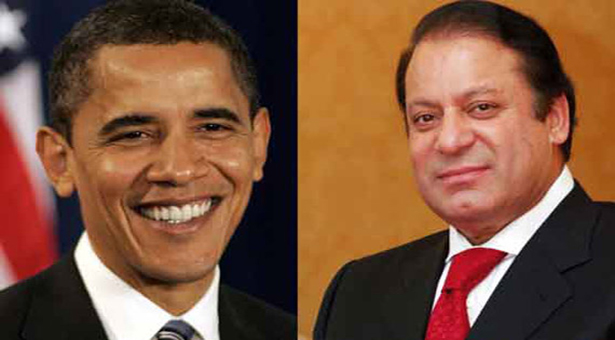As Pakistan Prime Minister Nawaz Sharif headed for a meeting with President Barack Obama, the US put terrorism in focus for their talks on how to strengthen “obviously a very important relationship”.
As Pakistan Prime Minister Nawaz Sharif headed for a meeting with President Barack Obama, the US put terrorism in focus for their talks on how to strengthen “obviously a very important relationship”.
Vice President Joe Biden set the tone for the discussions at Obama’s Oval office in the afternoon with a call to together “continue to combat terrorism and violent extremism” at a breakfast meeting Wednesday with Sharif at his Naval Observatory residence.
Biden “reaffirmed to the Prime Minister that together we must continue to combat terrorism and violent extremism and work to strengthen regional and global security,” said the White House readout of the meeting.
He also “reaffirmed the US commitment to strengthening bilateral ties in support of a strong, democratic, prosperous Pakistan” as the two “discussed many of the economic and development challenges that Pakistan faces” and the steps Sharif is taking to address them, it said.
Unlike last month’s summit with Indian Prime Minister Manmohan Singh, Obama is not hosting any meal for Sharif and would meet him in the Oval office after having lunch with his own vice president, who would also join the afternoon session.
As the Oval office session clearly focused on terrorism, a concern US equally shares with India, Sharif has little hope of getting much on his wish list — US mediation on Kashmir, nuclear parity with India and an end to drone strikes.
In fact, backing India’s description of Pakistan as the “epicentre of terrorism”, an analyst has suggested that “It certainly would be useful for the Obama administration to press Sharif hard on his country’s support for several terrorist groups.”
These include Lashkar-e-Taiba (LeT), “the group behind the Mumbai massacre of 2008” that according to Jeffrey Goldberg, writing for Bloomberg, “continues to openly operate in Pakistan.”
Thus Sharif’s plea to end drone strikes in Pakistan that he says “has become a major irritant in our bilateral relationship” is also unlikely to make much headway.
Shortly after Sharif made a plea on Tuesday for an end to drone strikes, calling them “a continual violation of our territorial integrity,” the White House press secretary Jay Carney put up a vigorous defence of the strikes.
IANS





